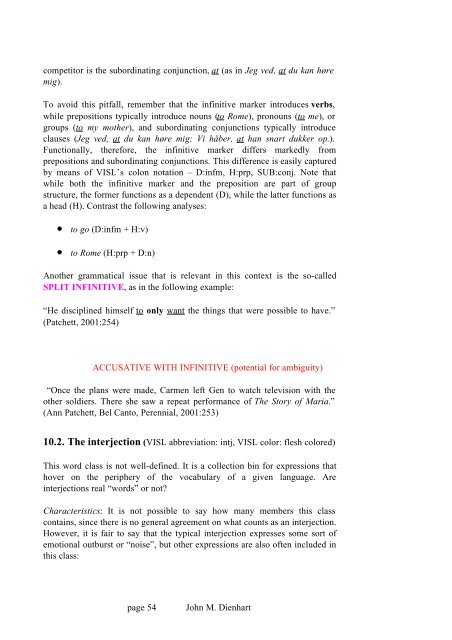Download - VISL
Download - VISL
Download - VISL
You also want an ePaper? Increase the reach of your titles
YUMPU automatically turns print PDFs into web optimized ePapers that Google loves.
competitor is the subordinating conjunction, at (as in Jeg ved, at du kan høre<br />
mig).<br />
To avoid this pitfall, remember that the infinitive marker introduces verbs,<br />
while prepositions typically introduce nouns (to Rome), pronouns (to me), or<br />
groups (to my mother), and subordinating conjunctions typically introduce<br />
clauses (Jeg ved, at du kan høre mig; Vi håber, at han snart dukker op.).<br />
Functionally, therefore, the infinitive marker differs markedly from<br />
prepositions and subordinating conjunctions. This difference is easily captured<br />
by means of <strong>VISL</strong>’s colon notation – D:infm, H:prp, SUB:conj. Note that<br />
while both the infinitive marker and the preposition are part of group<br />
structure, the former functions as a dependent (D), while the latter functions as<br />
a head (H). Contrast the following analyses:<br />
• to go (D:infm + H:v)<br />
• to Rome (H:prp + D:n)<br />
Another grammatical issue that is relevant in this context is the so-called<br />
SPLIT INFINITIVE, as in the following example:<br />
“He disciplined himself to only want the things that were possible to have.”<br />
(Patchett, 2001:254)<br />
ACCUSATIVE WITH INFINITIVE (potential for ambiguity)<br />
“Once the plans were made, Carmen left Gen to watch television with the<br />
other soldiers. There she saw a repeat performance of The Story of Maria.”<br />
(Ann Patchett, Bel Canto, Perennial, 2001:253)<br />
10.2. The interjection (<strong>VISL</strong> abbreviation: intj, <strong>VISL</strong> color: flesh colored)<br />
This word class is not well-defined. It is a collection bin for expressions that<br />
hover on the periphery of the vocabulary of a given language. Are<br />
interjections real “words” or not?<br />
Characteristics: It is not possible to say how many members this class<br />
contains, since there is no general agreement on what counts as an interjection.<br />
However, it is fair to say that the typical interjection expresses some sort of<br />
emotional outburst or “noise”, but other expressions are also often included in<br />
this class:<br />
page 54<br />
John M. Dienhart
















